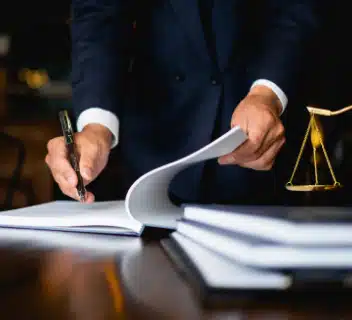What happens after a car accident that is your fault?
So you’ve been in a serious car accident — but after a car accident that is your fault, or not your fault, what happens? There’s a lot of complexity to a car accident dispute that many first-time plaintiffs are not aware of. Seemingly small issues can become significant legal challenges if you’re not prepared.
That being said, if you’ve been in a car accident and you’re partially at-fault, then in many cases you can still sue and recover compensation — though your compensation total might be somewhat affected.
Let’s take a closer look.
How partial fault works in an accident dispute
After a car accident that is your fault — well, partially your fault — you might be wondering whether you can still secure compensation. For plaintiffs who are partially at-fault, compensation is often possible, but it depends on your jurisdiction. States are divided into three legal systems when it comes to fault:
- Pure comparative fault: you can sue and recover damages even if you’re 99 percent responsible (i.e., at-fault) for the accident.
- Modified comparative fault: you can sue and recover damages, so long as you’re less than 51 percent responsible for the accident.
- Strict contributory fault: you cannot sue and recover damages if you’re partially at-fault.
So, if you’re in a pure or modified comparative fault state, chances are that you’d still be entitled to sue and recover. That being said, your total compensation is likely to be reduced by the percentage fault that you’ve contributed. For example, if a court finds that you’re 40 percent at-fault for your own injuries (due to not wearing a seatbelt), then your $100,000 damages claim could be reduced to a $60,000 recovery. Not bad, but just bear in mind that this percentage reduction could impact your recovery.
What to do after an accident that is not your fault?
After a car accident that is your fault (or not your fault), there are certain steps you should take to preserve your claims and to avoid undermining your ability to sue and recover the maximum amount of compensation. Here are some considerations to keep in mind in the wake of a car accident:
- Secure emergency medical assistance. Depending on the nature of your injuries, emergency medical care could be necessary to ensure your own safety. Your #1 priority should be to manage your health and safety.
- If possible, take pictures and videos of the accident scene. If you do not have an immediate medical need that forces you away from the accident scene, then you should take some time to obtain photos and videos of the accident and the surroundings. This can serve as valuable evidence.
- Contact law enforcement. Law enforcement officers will survey the scene and ask comprehensive questions, which will all be used to build out a police report that can later be brought in as evidence.
- Gather the contact information of eyewitnesses. Eyewitness testimony can be extremely useful for supporting your factual narrative during the car accident dispute.
- Avoid speaking extensively to insurers, defendants, and others. Your discussions could lead to disclosures that undermine liability and harm your ability to secure compensation in an eventual lawsuit.
- Obtain the assistance of an attorney as soon as possible. Your attorney will be able to communicate on your behalf, guide you along the early evidence-gathering and negotiation processes, and more.
For example, suppose you’ve been in an accident. After a car accident that is your fault (or not your fault), you may feel pressured to talk about the details with your insurance company. Don’t make that mistake! First, get in touch with an attorney who can provide guidance on how to speak with the insurance company — or who can speak on your behalf, thus preventing any sensitive disclosures.
Compensation in an accident dispute
In an accident dispute, there may be a variety of losses that you — the injured plaintiff — have sustained as a result of the defendant’s actions. These losses can be tallied up and claimed as damages, and if the court agrees, you will be entitled to compensation that covers the claimed losses.
Damages may include the following:
- Lost wages
- Loss of earning capacity
- Medical expenses
- Property loss
- Pain and suffering
- Loss of enjoyment of life
- And more
For example, suppose that you’re injured in a car accident, and you have medical bills that tally up to $100,000. Your injuries are also severe enough that you can’t return to work for six months. With a salary of $80,000, you therefore lose out on $40,000 in wages. That’s $140,000 in damages, not accounting for further pain and suffering damages — which could be $100,000 or more, even.
Losses can quickly add up, but you’ll have to be comprehensive in accounting for all of your post-accident losses!
Why you should get an attorney
Attorneys aren’t just advocates in a trial setting. They have a variety of different responsibilities and tasks to take care of over the course of litigation, from start-to-finish. These include (but are not limited to) the following:
- Identifying, gathering, and preserving evidence
- Managing eyewitness statements
- Working with experts on supportive testimony
- Communicating to others on behalf of the client
- Navigating legal procedural requirements
- Developing and executing a cohesive case strategy
- Negotiating a potential settlement compromise
- Handling court hearings and other processes
- Pushing forward to trial if settlement talks fall through
- Securing the final compensation amount for the client
- And more
Given the various responsibilities that an attorney can handle on your behalf — at a professional level — it’s worth consulting one as early as you can after an accident so that they can help you overcome the many challenges that you’re likely to face.
Contact 1-800-THE-LAW2 for a Free Legal Consultation
If you’ve been injured in a car accident, and it was partially your fault, then it’s important not to assume anything about your ability to sue — in many cases, you could be entitled to sue and obtain damages. Fault issues can be strategically managed by an experienced attorney, and your legal opportunities can change based on the jurisdiction in which your case is being litigated.
Contact 1-800-THE-LAW2 for a free legal consultation with an attorney in our network. During this initial consultation, you’ll have an opportunity to discuss your case in detail and learn more about the various strategic options. If you decide against moving forward, that’s ok — there’s no obligation to continue. So call in and get started!
We look forward to assisting you.




